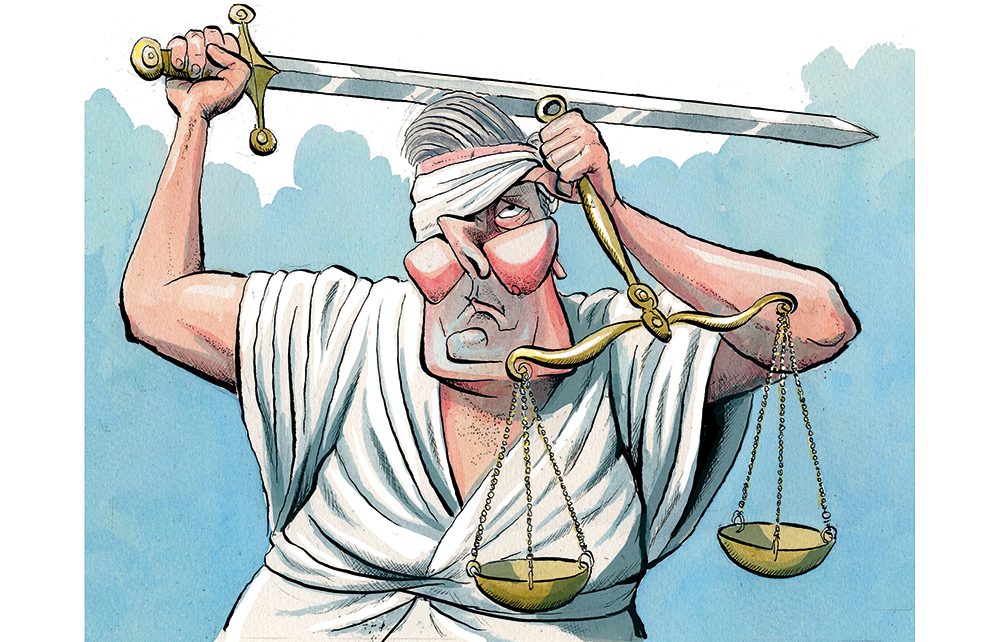One of Kemi Badenoch’s biggest announcements ahead of Conservative party conference was her pledge to leave the European Convention on Human Rights (ECHR). On Sunday, she said that exiting the ECHR would be a manifesto commitment at the next general election.
On the same day, a legal opinion by the shadow attorney general, Lord Wolfson KC, was circulated by the Conservatives. Lord Wolfson’s advice runs to 185 pages, and he acknowledges the support of a team of barristers, solicitors and academics (I declare an interest here, having contributed part of a section on the mechanics of leaving).
With even Labour now accepting that serious change is needed, it appears the status quo is politically indefensible
The opinion sets out five tests for leaving and states, among other things, that:
‘the ECHR places significant legal constraints on the government’s ability to address immigration, veterans and protest issues and, currently, places some legal constraints on social housing, benefits and infrastructure projects (with the potential for climate-change litigation being the most significant risk of further interference).’
Lord Wolfson concludes that, to remove these constraints, the simple answer is to leave the ECHR. He argues that neither the Good Friday Agreement nor the UK’s Trade and Cooperation Agreement with the EU should act as legal barriers to exit (although he acknowledges that they will require ‘careful consideration’ and will ‘no doubt raise political issues’).
His advice adds weight to those who argue that something significant needs to be done about the ECHR, and gives precise examples of where it has come into conflict with democratic decision-making.
While the Conservative party has entered several elections promising human rights reform, this is the first time it has proposed exiting the ECHR. It is a significant shift and, while Lord Wolfson accepts that it is not a ‘silver bullet’ for solving the UK’s issues, it is nonetheless a clear-cut policy decision. It is also a decision that aligns the Conservatives with Reform UK on this question.
There will no doubt be significant discussion in legal circles about Lord Wolfson’s advice, and political disagreement about the potential risks that leaving the ECHR could pose in respect of Northern Ireland and police and justice cooperation with the EU. But, having now reached a settled position on the issue, the ball of human rights reform is firmly in Labour’s court for the next few years.
This presents Keir Starmer with a potential difficulty. Labour has already accepted that there is an issue with how the ECHR is used in immigration and asylum cases. In March this year, the government promised a review of how Article 8 of the ECHR (the right to family life) is being interpreted and applied by UK judges. In September, the Home Secretary, Shabana Mahmood, went further and said the government would legislate to limit the application of Article 8 and also ‘pursue international reform’.
I have previously argued that the best approach to these issues is to seek international consensus on reform of the Convention. Indeed, Lord Wolfson’s advice states that if there were significant reform of the ECHR – or of the jurisprudence or approach of the European Court of Human Rights – then his advice should be reconsidered.
Yet Starmer’s accident-prone Attorney General, Lord Hermer KC, last month described the chances of making swift changes to the ECHR as a ‘political trick’, noting that it would require the unanimous consent of the 46 member states of the Council of Europe. He pointed out that the last attempt to reform the ECHR – following the Brighton Declaration of 2012 – took nine years between declaration and implementation.
This presents a real problem. Labour needs to come up with a solution to issues such as small boats and the deportation of foreign national offenders quickly, if it is to address concerns about the use of the ECHR.
It seems highly unlikely that its latest attempt (the one-in, one-out deal with France) will have a deterrent effect. And while the government has won an initial legal challenge against the operation of the scheme, there is no guarantee that future removals won’t become bogged down in legal proceedings.
Further electorally damaging human rights issues are likely to emerge over veterans’ rights in the next year – particularly if Labour repeals the conditional immunity granted by the previous Conservative administration to combatants in the Troubles in Northern Ireland. Any attempt by the government to reform protest laws, or grant the police broader powers to restrict ‘repeated protests’, will also probably be subject to legal challenge under the Convention.
Proponents of the ECHR may well pull out the old playbook – again asking which of the Convention rights voters would like to do without, or portraying the ECHR as ‘Churchill’s legacy’ (despite the fact that the UK did not initially accept the jurisdiction of the Strasbourg Court). However, with even Labour – the party that ‘brought rights back home’ with its Human Rights Act – now accepting that serious change is needed, it appears the status quo is politically indefensible.
It will be for Starmer and his allies to convince the public that they can do enough to address these concerns in advance of the next election. Otherwise, UK membership of the Convention is unlikely to be preserved.







Comments